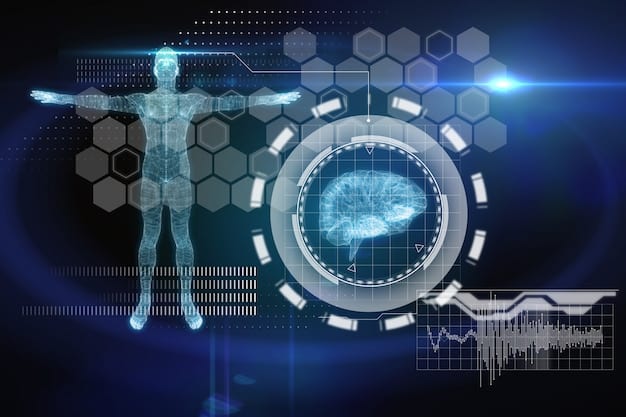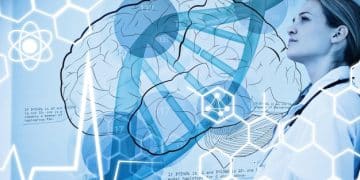Ethical AI in US Healthcare: Navigating the Diagnostic Dilemmas

The ethical implications of AI-driven healthcare diagnostics in the US encompass concerns about data privacy, algorithmic bias leading to disparities, the potential deskilling of healthcare professionals, and the impact on patient autonomy and trust.
The rise of artificial intelligence (AI) in healthcare promises unprecedented advancements in diagnostics, offering the potential for earlier and more accurate disease detection. However, the integration of AI into healthcare diagnostics in the US also raises significant ethical implications of AI-driven healthcare diagnostics in the US that demand careful consideration.
Understanding AI-Driven Healthcare Diagnostics
AI-driven healthcare diagnostics refers to the use of artificial intelligence algorithms and machine learning models to analyze medical data and assist in the diagnosis of diseases and conditions. This technology has the potential to revolutionize healthcare by improving diagnostic accuracy, increasing efficiency, and reducing healthcare costs.
AI systems can analyze vast amounts of medical data, including imaging scans, laboratory results, and patient history, to identify patterns and anomalies that may be indicative of disease. This can lead to earlier and more accurate diagnoses, allowing for more effective treatment and improved patient outcomes.
Benefits of AI in Diagnostics
AI-driven diagnostics offers several potential benefits, including:
- Improved Accuracy: AI algorithms can analyze medical data with greater precision than humans, reducing the risk of diagnostic errors.
- Increased Efficiency: AI systems can automate many diagnostic tasks, freeing up healthcare professionals to focus on more complex cases.
- Reduced Costs: By improving diagnostic accuracy and efficiency, AI can help reduce healthcare costs associated with unnecessary tests and treatments.
- Early Detection: AI can detect early signs of disease, allowing for earlier intervention and improved patient outcomes.

Despite these potential benefits, the use of AI in healthcare diagnostics also raises a number of ethical concerns that must be addressed to ensure that this technology is used responsibly and ethically.
Data Privacy and Security Concerns
One of the primary ethical concerns surrounding AI-driven healthcare diagnostics is the issue of data privacy and security. AI systems require access to vast amounts of patient data to learn and improve their performance. This data may include sensitive information such as medical history, genetic information, and lifestyle habits.
The collection, storage, and use of this data raise concerns about patient privacy and the potential for data breaches. If patient data is not properly protected, it could be accessed by unauthorized individuals or organizations, leading to identity theft, discrimination, or other harms.
Protecting Patient Data
To address these concerns, healthcare organizations must implement robust data privacy and security measures, including:
- Data Encryption: Encrypting patient data to prevent unauthorized access.
- Access Controls: Limiting access to patient data to only authorized personnel.
- Data Anonymization: Removing identifying information from patient data before it is used for AI training.
- Regular Audits: Conducting regular audits to ensure that data privacy and security measures are effective.
Furthermore, patients should be informed about how their data will be used for AI-driven diagnostics and given the opportunity to opt-out if they choose. Transparency and patient consent are essential for building trust in AI-driven healthcare diagnostics.
Addressing these data privacy and security concerns are crucial for ensuring that AI is used ethically and responsiblely in improving healthcare diagnostics.

Algorithmic Bias and Disparities
Another significant ethical concern is the potential for algorithmic bias to lead to disparities in healthcare outcomes. AI algorithms are trained on data, and if that data reflects existing biases in healthcare, the algorithms may perpetuate or even amplify those biases.
For example, if an AI algorithm is trained primarily on data from white patients, it may be less accurate when diagnosing diseases in patients from other racial or ethnic groups. This could lead to misdiagnosis, delayed treatment, and poorer health outcomes for marginalized populations. Understanding the ethical implications of AI-driven healthcare diagnostics in the US requires carefully examining how biases are handled.
Sources of Algorithmic Bias
Algorithmic bias can arise from several sources, including:
- Data Bias: The data used to train AI algorithms may be biased, reflecting existing disparities in healthcare access and outcomes.
- Selection Bias: The selection of data for AI training may be biased, leading to algorithms that are not representative of the broader population.
- Measurement Bias: The way that data is measured and collected may be biased, leading to inaccurate or incomplete information.
To mitigate algorithmic bias, healthcare organizations must carefully evaluate the data used to train AI algorithms and implement measures to ensure that the algorithms are fair and equitable. This may involve collecting more diverse data, using fairness-aware machine learning techniques, and regularly auditing AI algorithms for bias.
It’s imperative to focus on mitigating algorithmic bias and ensuring AI algorithms are fair in order to address the ethical implications of AI-driven healthcare diagnostics in the US.
Impact on Healthcare Professionals
The integration of AI into healthcare diagnostics also has the potential to impact healthcare professionals. While AI can assist in diagnosis, there are concerns that it could lead to the deskilling of healthcare professionals or the replacement of human expertise.
If healthcare professionals become overly reliant on AI algorithms, they may lose their own diagnostic skills and critical thinking abilities. This could lead to errors if the AI algorithm provides an incorrect diagnosis or if the healthcare professional is unable to interpret the AI’s findings.
Maintaining Human Expertise
To mitigate these risks, healthcare organizations must ensure that healthcare professionals receive adequate training in the use of AI-driven diagnostics. This training should focus on:
- Understanding AI Algorithms: Healthcare professionals should understand how AI algorithms work and their limitations.
- Interpreting AI Findings: Healthcare professionals should be able to interpret the findings of AI algorithms and integrate them into their clinical decision-making.
- Maintaining Critical Thinking Skills: Healthcare professionals should continue to develop their own diagnostic skills and critical thinking abilities.
AI should be viewed as a tool to augment human expertise, not replace it. Healthcare professionals should use AI to inform their decision-making, but they should also rely on their own clinical judgment and experience. Therefore, education and training ensures AI is utilized as a human-augmentaion tool that maintains focus on the ethical implications of AI-driven healthcare diagnostics in the US.
Patient Autonomy and Trust
The use of AI in healthcare diagnostics also raises questions about patient autonomy and trust. Patients may be hesitant to trust AI algorithms to make decisions about their health, especially if they do not understand how the algorithms work.
Patients have a right to understand how AI is being used in their care and to make informed decisions about their treatment. Healthcare organizations must be transparent about the use of AI and provide patients with clear and understandable explanations of how AI algorithms work.
Promoting Transparency and Understanding
To promote patient autonomy and trust, healthcare organizations should:
- Provide Clear Explanations: Explain to patients how AI is being used in their care and how it will impact their diagnosis and treatment.
- Offer Alternative Options: Provide patients with alternative diagnostic options if they are not comfortable with AI-driven diagnostics.
- Respect Patient Preferences: Respect patient preferences and allow them to make informed decisions about their care.
Transparency and patient education are crucial for building trust in AI-driven healthcare diagnostics. When patients understand how AI is being used and have a voice in the decision-making process, they are more likely to embrace this technology and benefit from its potential.
In conclusion, to address the ethical implications of AI-driven healthcare diagnostics in the US transparency and patient autonomy should remain top priorities.
Regulatory and Legal Frameworks
The rapid development of AI in healthcare diagnostics has outpaced the development of regulatory and legal frameworks. This creates uncertainty about the legal and ethical responsibilities of healthcare organizations and AI developers.
There is a need for clear regulatory guidelines and legal frameworks to govern the development, deployment, and use of AI in healthcare diagnostics. These frameworks should address issues such as data privacy, algorithmic bias, accountability, and liability.
Developing Ethical Frameworks
To address these issues, policymakers and stakeholders should work together to develop ethical frameworks that promote responsible innovation in AI-driven healthcare diagnostics. These frameworks should:
- Promote Transparency: Require transparency about the development and deployment of AI algorithms.
- Ensure Accountability: Establish clear lines of accountability for the use of AI in healthcare.
- Protect Patient Rights: Protect patient rights to privacy, autonomy, and informed consent.
Regulatory frameworks are critical for fostering trust and ensuring that AI is used ethically and responsibly in improving healthcare diagnostics. The ethical implications of AI-driven healthcare diagnostics in the US must be handled by legal frameworks.
Future Directions and Considerations
The future of AI-driven healthcare diagnostics is full of promise, but it also requires continued attention to ethical implications. As AI technology evolves, healthcare organizations must continually reassess their ethical frameworks and adapt their practices to address new challenges.
Collaboration between healthcare professionals, AI developers, policymakers, and patients is essential for ensuring that AI is used in a way that benefits all members of society. Ongoing dialogue and engagement can help to identify and address ethical concerns before they become major problems.
Focus on Continuous Monitoring and Improvement
To guide AI’s use, healthcare organizations should focus on:
- Continuous Monitoring: Monitor AI algorithms for bias and accuracy on an ongoing basis.
- Continuous Improvement: Work to improve the performance and fairness of AI algorithms over time.
- Ethical Training: Provide ongoing ethical training to healthcare professionals and AI developers.
With careful consideration of the ethical implications and a commitment to responsible innovation, AI-driven healthcare diagnostics has the potential to transform healthcare and improve the lives of millions of people. To properly address the ethical implications of AI-driven healthcare diagnostics in the US a continued eye on improvement is needed.
| Key Point | Brief Description |
|---|---|
| 🛡️ Data Privacy | Protecting patient data is crucial for building trust and ensuring responsible AI use. |
| ⚖️ Algorithmic Bias | Mitigating bias is essential for fair and equitable AI-driven diagnostics. |
| 🧑⚕️ Healthcare Professionals | AI should increase the experience of healthcare professionals, not deskill it. |
| 🤝 Patient Trust | Transparency and patient autonomy are vital for fostering trust in AI. |
Frequently Asked Questions
▼
The key ethical concerns revolve around data privacy, algorithmic bias, impact on healthcare professionals’ skills, and ensuring patient autonomy and trust in AI-driven decisions.
▼
Algorithmic bias can be addressed by collecting diverse datasets, using fairness-aware machine learning techniques, and regularly auditing AI algorithms for biased outcomes.
▼
Measures include data encryption, strict access controls, data anonymization techniques, and regular security audits to prevent unauthorized data breaches and ensure patient privacy.
▼
AI should augment rather than replace healthcare professionals, requiring ongoing training to interpret AI findings critically and maintain diagnostic skills alongside AI assistance.
▼
Patient autonomy is vital because it ensures individuals have the right to understand and make informed decisions about AI’s use in their care, promoting trust and ethical alignment.
Conclusion
In conclusion, the ethical implications of AI-driven healthcare diagnostics in the US are complex and multifaceted. Addressing these implications requires a multi-stakeholder approach involving healthcare professionals, AI developers, policymakers, and patients. By prioritizing data privacy, fairness, transparency, and patient autonomy, we can harness the power of AI to improve healthcare while upholding ethical values.





